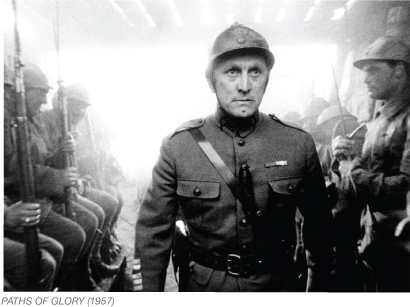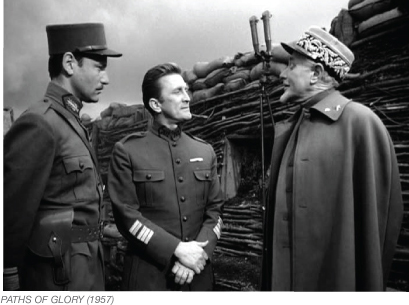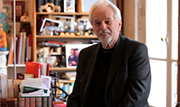
What's your favorite film? Is there a movie that changed your life? Send us an essay of 500 words, give or take, about that film you can't forget — classic or contemporary — and we'll consider it for publication in these pages. In addition to your short essay, send your name, occupation, hometown, phone number, jpeg headshot and e-mail address to editor@AFI.com. We reserve the right to edit for length and clarity.
READER REVIEW: PATHS OF GLORY (1957)
By Anne Hamilton

Anne Hamilton is a current participant in the American Film Institute's Directing Workshop for Women. She has a J.D. from Yale Law School, and studied philosophy at Stanford and Notre Dame. She practiced law for a few years before moving to L.A. to write and direct her own films.
 On first impression, the last scene in PATHS OF GLORY does not fit the rest of the movie. The 1957 American anti-war film, directed by Stanley Kubrick and based on the novel by Humphrey Cobb, tells the true story of Colonel Dax, played by Kirk Douglas, as the commanding officer of French soldiers during World War I, who refuses to continue a suicidal attack on a German stronghold. Col. Dax attempts to defend three soldiers against a charge of cowardice in a court-martial, and fails. By the time we reach the last scene, we have watched as Col. Dax has endured battlefield carnage pursuing a target that he knows cannot be taken, and seen him zealously defend scapegoated men in a morally corrupt court-martial hearing that he knows he cannot win. The film seems to be about terrible struggle without an exit.
On first impression, the last scene in PATHS OF GLORY does not fit the rest of the movie. The 1957 American anti-war film, directed by Stanley Kubrick and based on the novel by Humphrey Cobb, tells the true story of Colonel Dax, played by Kirk Douglas, as the commanding officer of French soldiers during World War I, who refuses to continue a suicidal attack on a German stronghold. Col. Dax attempts to defend three soldiers against a charge of cowardice in a court-martial, and fails. By the time we reach the last scene, we have watched as Col. Dax has endured battlefield carnage pursuing a target that he knows cannot be taken, and seen him zealously defend scapegoated men in a morally corrupt court-martial hearing that he knows he cannot win. The film seems to be about terrible struggle without an exit.
The last scene, by contrast, takes place in a saloon filled with merry soldiers, banging their beer steins on the tables as the owner brings a frightened German girl (the first and only appearance of a female in the film), who is a prisoner of war, onstage. The girl is terrified standing in front of these enemy onlookers, as her chief tormentor makes cruel and threatening remarks about her body and her lack of talent. In order to draw out the sadistic play, he commands her to sing. Hoots and whistles arise from the crowd. The girl begins to sing a bedtime song in German, so simple and quiet that the men talk over it at first.
 Then, something incredible happens. The noise from the crowd gradually dies away as her tremulous voice fills the space. In that moment, one by one, the soldiers become children again, each crying softly as they dissolve into the music. Outside Col. Dax receives news that he and his men must immediately return to the front (and certain death), and he responds, simply, that he should give the men just “a few minutes more.”
Then, something incredible happens. The noise from the crowd gradually dies away as her tremulous voice fills the space. In that moment, one by one, the soldiers become children again, each crying softly as they dissolve into the music. Outside Col. Dax receives news that he and his men must immediately return to the front (and certain death), and he responds, simply, that he should give the men just “a few minutes more.”
Most war movies are in some form a glorification of battle, and if not of battle then a glorification of patriotism. PATHS OF GLORY is an exception. The theme, stated in the first act by Col. Dax, is “patriotism is the last refuge of the scoundrel,” and is as important today as it was in 1957. It deserves our meditation.
In the face of massive global problems facing us like the current worldwide immigration crises, food shortages, and the destruction of the planet through climate change, patriotism — and with it, the implicit idea that our destiny is somehow separate from those of our enemies — would seem quaint were it not so nefarious. Kubrick’s film is a wonderful reminder of this reality.
PATHS OF GLORY is a story about the ultimate limitation that faces us all and the beauty in resisting, even if we know that all resistance is futile. That is what makes it my favorite movie.
Edit Here




